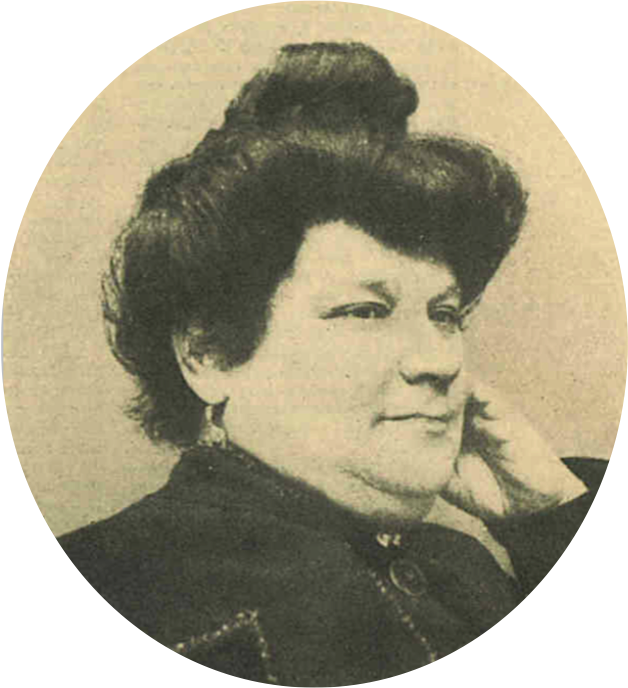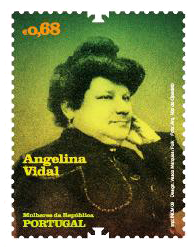
Angelina Casimira do Carmo e Silva Vidal was born on the 11th of March of 1853, in Lisbon, having distinguished herself as one of the most striking figures in the struggle for the rights of the disadvantaged, thus aligning her ideology with that of the progressive current of the time.
Despite coming from a middle-bourgeois family, she faced enormous adversities early in her life, as a result of having become an orphan at the age of 9. Dissatisfied with the prosaic education she allegedly received at a convent school, Angelina kept constantly striving to cultivate herself as broadly as possible, an attitude that eventually led her to Luís Campos Vidal, a respected physician whom she would marry in 1848, at the age of 19. Even though the couple had five children, they would eventually part ways, which resulted in her losing custody of the children, seeing as the status of a divorced woman, in the eyes of the Portuguese monarchic society of the late nineteenth century, was still met with tremendous reluctance.
Socially stigmatized and forced to struggle for her subsistence, she finally found some solace in 1901, when, due to the persistence of the female workers of a tobacco factory for whom Angelina had fought, she was awarded a monthly subvention by the A Voz do Operário (The Voice of the Worker) society, provided that she gave French lessons at this institute. A similar effort would be necessary in 1904, when she had to be yet again financially rescued by the ever-grateful female workers.
Belonging, at the time, to a restrict group of women that attempted to earn compensation through non-mechanical/manual jobs, Vidal worked as a journalist, translator, teacher and writer. Also multifaceted in what concerns to literary genres, from poetry to theatre, she wrote several plays, most of which were subsequently staged, therein lying – once the famine period was over - her main source of income. In effect, immediately at the beginning of her career, she managed to win two international prizes, for the poem A Morte do Espírito (The Death of the Spirit), in 1885, and for Ícaro (Icarus), in 1902.
She was also widely acknowledged as a journalist, having integrated the Portuguese Press Association, but her greatest recognition derived from the propagandist bond she established with the working-class universe, especially through her connection with the aforementioned Society of Education and Beneficence The Voice of the Worker. Accordingly, she collaborated with various working-class and unionist newspapers, among them the publication Pró-Infância, in partnership with figures such as Heliodoro Salgado, Teixeira Bastos, Miguel Bombarda, Magalhães Lima, Máximo Brou and França Borges. In this line of thought, her activism towards women´s rights, particularly those of the blue-collar female workers, also stood out, which ended up being perfectly aligned with the republican and socialist ideologies that would define her progressively political path. Not unlike other intellectual women of the time, Vidal regarded female emancipation as an indispensable condition for civilizational progress, as she maintained that education and, especially, work, were the most important pillars of a woman´s life, yet without ever neglecting her maternal responsibilities.
Angelina Vidal died in Lisbon, on the 1st of August of 1917, precisely in the year when she was finally awarded a widow´s pension, which she sorely lacked. Her funeral – whose expenses were covered by the newspaper O Século – was attended by personalities hailing from different fields, and featured speeches delivered by representatives of the Socialist Party, the Socialist Municipal Federation of Lisbon, the Voice of the Worker, the League of Mutualist Associations, the Indigenous National Committee and of the Manipulators of Tobacco.
On the 5th of October of 2009, the CTT (Postal Services of Portugal) issued a collection of stamps intended to pay tribute to a group of “women whose actions and testimonies transformed them into figures indelibly associated with the history of the Republic”. Such collection, aptly titled Women of the Republic, “evokes activists of female rights from the early days of the Republic”, and in it one can find Angelina Vidal, along with Maria Veleda, Carolina Michaëlis de Vasconcelos, Adelaide Cabete, Ana de Castro Osório, Carolina Beatriz Ângelo, Virgínia Quaresma and Emília de Sousa Costa.
Angelina Casimira do Carmo e Silva Vidal nasceu a 11 de Março de 1853, em Lisboa, tendo-se afirmado como uma das mais marcantes figuras na defesa de direitos concernentes às classes sociais desfavorecidas, alinhando assim a sua ideologia com a da corrente progressista da época.
Não obstante ter nascido no seio de uma família médio-burguesa, Angelina cedo se confrontou com inúmeras adversidades, desde logo por ter ficado órfã aos 9 anos. Inconformada com a educação prosaica que terá recebido num colégio de freiras, procurou sempre continuar a instruir-se da forma mais abrangente possível, atitude que acabou por a conduzir a Luís Campos Vidal, um respeitado médico com quem viria a casar em 1848, com 19 anos. Apesar dos cinco filhos decorrentes do matrimónio, o casal acabaria por separar-se doze anos depois, situação que a levou inclusivamente a perder a tutela das crianças, uma vez que o estado de divorciada, aos olhos da sociedade monárquica portuguesa de finais do séc. XIX, era ainda encarado com considerável relutância.
Socialmente estigmatizada e forçada a lutar pela sua subsistência, encontrou finalmente algum amparo em 1901, quando, após a insistência de operárias de fábricas de tabaco por quem Angelina havia lutado, lhe foi concedida uma subvenção mensal por parte da sociedade A Voz do Operário, no âmbito da qual leccionaria a disciplina de francês. Igual esforço viria a repetir-se em 1904, quando necessitou de ser novamente socorrida, do ponto de vista financeiro, pelas sempre gratas operárias.
Pertencendo, à época, a um grupo residual de mulheres que procuravam auferir remuneração em empregos não-mecânicos/manuais, Vidal trabalhou como jornalista, tradutora, professora, olissipógrafa e escritora. Multifacetada também no que respeita aos géneros literários, desde a poesia ao teatro, escreveu variadas peças, a maioria das quais subsequentemente encenadas, daqui passando a advir, ultrapassado o período de penúria, a sua principal fonte de rendimento. Com efeito, arrecadou, logo no início da sua carreira, dois prémios internacionais, pelo poema A Morte do Espírito, em 1885, e por Ícaro, em 1902.
Foi também amplamente respeitada enquanto jornalista, tendo integrado a Associação da Imprensa Portuguesa, embora se tenha tornado sobretudo reconhecida pelo vínculo propagandista que estabeleceu com o universo operário, sobretudo na sua associação à Sociedade de Instrução e Beneficência A Voz do Operário. Nesse sentido, colaborou com diversos jornais operários e sindicalistas, entre os quais o jornal Pró-Infância, em parceria com Heliodoro Salgado, Teixeira Bastos, Miguel Bombarda, Magalhães Lima, Máximo Brou, França Borges, entre outros. Nesta linha de pensamento, destaca-se também o seu activismo em torno dos direitos femininos, designadamente direccionado à mulher operária, que acaba por estar em total consonância com a ideologia republicana, numa primeira fase, e com a doutrina socialista, num momento posterior, que viriam a pautar o seu percurso progressivamente político. À imagem de outras mulheres intelectuais da época, Vidal via na emancipação feminina uma condição imprescindível para o progresso civilizacional, defendendo que a educação e, sobretudo, o trabalho, constituiriam os mais importantes pilares da vida da mulher, que nunca deveria descurar, contudo, as suas responsabilidades maternais.
Angelina Vidal morreu em Lisboa, a 1 de Agosto de 1917, justamente no ano em que lhe foi enfim atribuída uma pensão de viuvez, que tanta falta lhe fazia. Ao seu funeral, cujas despesas foram asseguradas pelo jornal O Século, compareceram personalidades de diversas áreas, tendo-se assistido a discursos proferidos por representantes do Partido Socialista, da Federação Municipal Socialista de Lisboa, da Voz do Operário, da Liga das Associações Mutualistas, do Comité Nacional dos Indígenas e dos Manipuladores do Tabaco.
A 5 de Outubro de 2009 os CTT fizeram uma emissão filatélica com o objectivo de homenagear um grupo de “mulheres cuja acção e testemunho as tornaram figuras indelevelmente associadas à história da República”. Esta coleção, denominada Mulheres da República, “evoca activistas dos direitos femininos dos primeiros tempos da República”, e dela faz parte Angelina Vidal, juntamente com Ana de Castro Osório, Maria Veleda, Adelaide Cabete, Carolina Beatriz Ângelo e Carolina Michaëlis de Vasconcelos, Virgínia Quaresma e Emília de Sousa Costa.

References:
- Women Writers in History Database, Angelina Vidal.
- CASTRO, Zília, ESTEVES, João (dir.), Dicionário no Feminino (séculos XIX-XX), Lisboa, Livros Horizonte, 2005.
- SAMARA, Maria Alice, Operárias e Burguesas: As Mulheres no Tempo da República, A Esfera dos Livros, Lisboa, 2007.